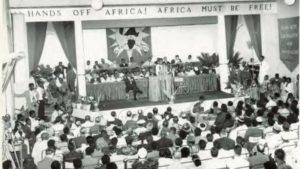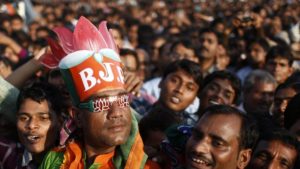The cost of the 2016 US elections was $6.5 billion if we combine the presidential and congressional elections. The Indian Parliamentary election of 2019 outspent the 2016 US 2016 election, costing about $8.6 billion. Where does all this money go, whether in India or the US? And why is the cost of elections—the motor of democracy—climbing to astronomical heights when all other welfare investments are declining? There’s an answer in the Netflix film The Great Hack that points to the marriage between big money and big data.
The Great Hack relates Cambridge Analytica’s role in Trump’s 2016 elections to a much larger issue—the threat to our democracy from global tech giants. It is not the Facebook data that Cambridge “hacked,” but the election itself. And what is at stake is not just an election, but the very future of democracy. If elections can be hacked, so can our democracy. The film poses a fundamental question for our times: Are more elections in more places going to be won by the best data “team” that money can buy?
The Indian elections of 2014 and 2019 raised similar questions. Shivam Singh’s book, How to Win an Indian Election, covers very similar ground to show that elections can indeed be hacked, using big money and big data.
The role of advertising and media consultants in elections is not new. With the growth of mass media, the methods of selling soaps and detergents also became the method to sell politics. What has been added now is the power of micro-targeting: targeting each individual based on knowing, in minute detail, what makes us tick. An average person leaves enough digital footprints to generate 5,000 data points today; these are used by big data companies to target each one of us with ads. This is what has made Google, Facebook and Amazon—and now Alibaba and WeChat as well—among the world’s ten biggest companies.
We have known much of this. What The Great Hack adds to our understanding is that a lot of these “tools” came out of the military’s psychological operations (or psyops) and cyberwar techniques. They were even classified as weapons under export control regimes. These tools are used to spread hate, disinformation and divisions—fake news, in other words—in the “enemy” ranks, or any targeted population in countries slated for regime change.
The other insight of the film is that it is not the big votes that count in an electoral victory. These votes are generally decided, and difficult to shift. What counts is a small section of votes. If these votes are turned, they can tip the election from defeat to victory. In the US elections, for instance, given the lopsided nature of the electoral college system, just 70,000 voters in three states gave Trump his victory over Hillary.
If we understand the psychological profile of a voter, or what Alexander Nix of Cambridge Analytica calls the psychometric profile, we can do two things: We can discourage voters who would probably vote for the other side; and we can encourage the voters from “our side” to come out and vote. The film shows a successful example in Trinidad: young people of color were targeted with a “movement” message—the Do-So movement—how “cool” it is to not vote. The other side was encouraged to vote with messages about family values such as listening to parents.
In the recent Indian elections, for example, data analysis in the largest state—Uttar Pradesh (UP)—shows that the ruling right-wing Bharatiya Janata Party (BJP) strongholds had a higher turnout than those of the opposition alliance—Samajwadi Party (SP) and the Bahujan Samaj Party (BSP)—indicating the success of a similar campaign. If you are an opposition voter, you were targeted with messages about how all politicians are corrupt, and how elections serve no purpose. To the ruling BJP voters, the messaging was that patriotism demands you vote to strike a blow against “our enemies.”
Though the film focuses on Cambridge Analytica and the Trump elections, it also registers the role of global right-wing networks using big money and deeply divisive messaging. This is visible, for example, in Bolsonaro’s victory in Brazil, where a massive fake news campaign was mounted using WhatsApp, Facebook’s messaging platform.
The Great Hack also brings us face to face with the dystopian world that Facebook and Google have created—a social media world that divides us rather than connecting us. Early on, Facebook realised that our anxieties and our fears are far more potent as advertising tools than our “likes.” When Facebook and Google sell our anxieties, fears and hatred to advertisers, what is, arguably, the worst side of humanity explodes in the social media space.
This is also what MIT researchers found out: they discovered that fake news penetrates deeper, faster and wider than actual news.
Hate pulls in eyeballs to TV screens as well. This explains the rise of hate TV and fake TV: Fox News in the US and the gaggle of Republic/Zee/Times Now troll television channels in India. This is the transformation taking place today in the media space, particularly in all forms of electronic media—from television to social media.
The question is: What are we going to do? The Great Hack argues that data privacy and individual ownership of our data is the answer. But the view that data belongs to us opens up the possibility that big corporations can indeed own our data, but only after purchasing it. It does not change the fundamental business model of the big data companies.
Data as private property would still it make possible for our “eyeballs” to be bought and sold like any other goods; to allow data and power to be concentrated in the hands of big tech companies. Social media giants are not neutral in this game. Their business models are built on algorithms that are not simply mathematics. They encode our prejudices and Mark Zuckerberg’s business needs in their algorithms. The swing to the global right and the rise of hate politics are coded in the gene of Google and Facebook. Copycat politics of the right transferred to liberal, democratic or left spaces is not the answer.
Seeing data as private property means missing the fact that data is not simply our individual data, but also that of our social relations, and data that belongs to communities and groups. Instead of focusing on how to keep data in our hands as commodities that belong to us, we must look at how data is common to us; how it belongs to the commons and is not a commodity. We must treat the data of our social relationships, and community data, as something that cannot be bought and sold.
Next, how do we safeguard our elections? Our democracy? The answer has always been to limit the role of money in elections. Big data requires big money. Hiring an election analytics company with access to big data requires big bucks. Limiting the role of money in elections is an essential part of any campaign to ensure the future of democracy, including our elections.
It is not enough to limit the role of money in elections. We also need to build grassroots activism, using social media not for clicktivism but for building movements; and strengthen democratic media and platforms—all of them, not just the digital ones.
People can be manipulated by fear and hatred for a short time, but not for long, and certainly not forever. They will come back to the real issues, issues that bind us instead of dividing us. Getting past hate to real people and their issues is the battle for the future of our democracy.
(Prabir Purkayastha is an activist for science and the Free Software movement.)




